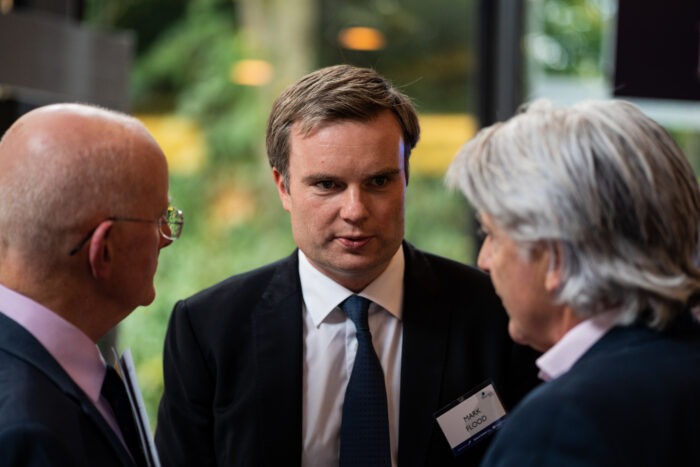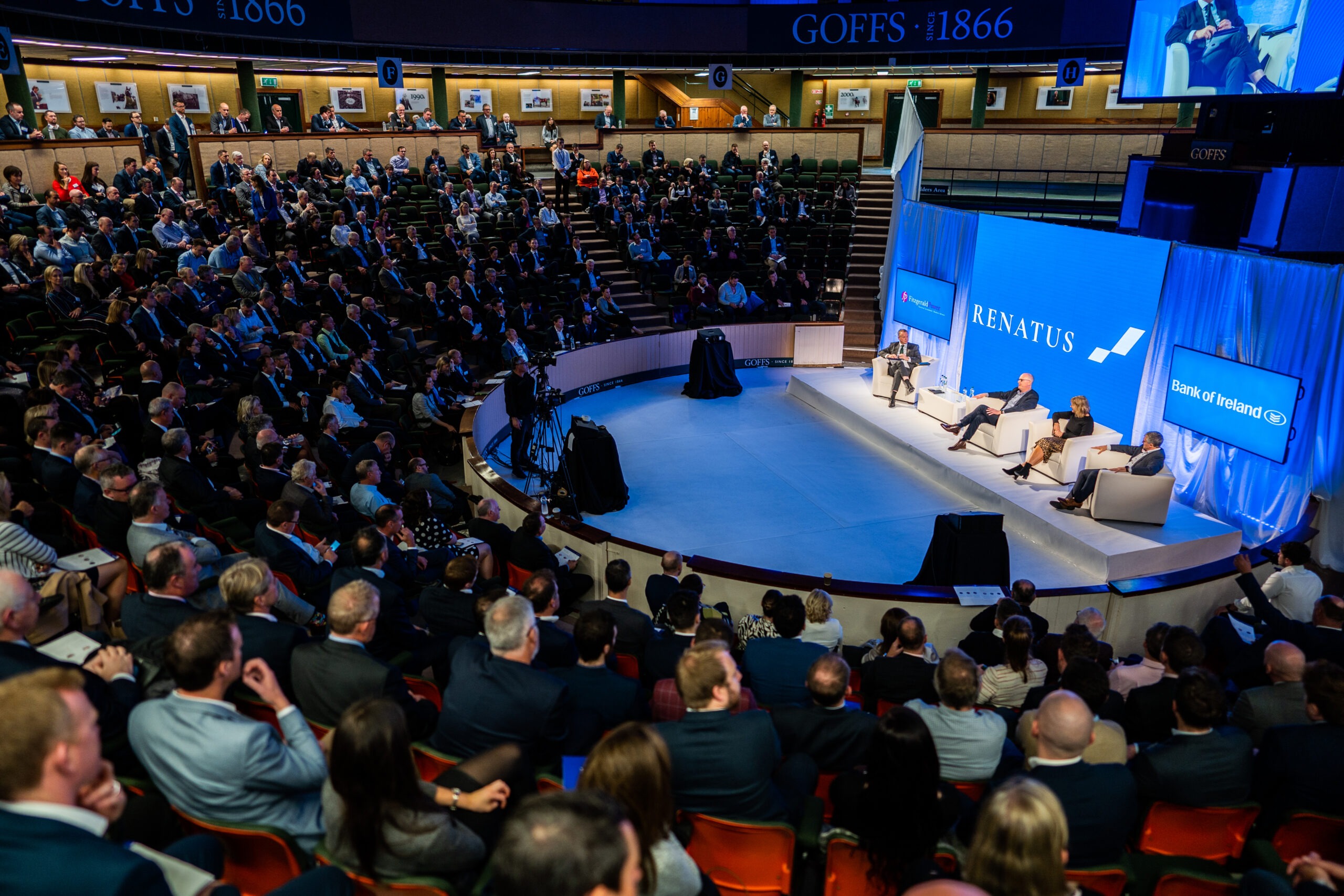Mark Flood, director of Renatus Capital Partners, is in his car between dealmaking when we go on our video call. On the other side of the screen is Stuart Fitzgerald, the chief executive of Fitzgerald Power, who is sitting in his office in Waterford city centre. Flood and Fitzgerald are on the call to talk about The Real Deal, a giant SME conference in Goffs, Co Kildare, where one thousand people will gather on May 3 to discuss buying, selling, and raising investment from private equity.
Our conversation ranges widely from what sectors they expect to be consolidated next, to the pros and cons of taking in investment, to the outlook for the Irish economy. But first, we talk about the thinking behind the two experienced corporate advisors and investors coming together to co-found The Real Deal event now in its fourth year.
“Players want to hear from players,” Flood said. “We wanted to run an event for entrepreneurs. The world is evolving in terms of deals so we wanted to create somewhere to hear first-hand stories. The other thing is the location in Co Kildare – a lot of business happens outside the M50 so we wanted to create something that was accessible to them.”
“There is no fluff or nonsense,” Fitzgerald added. “Nobody is on stage selling. It is about listening to legends in business, learning, and networking.”
Speakers at this year’s event include Vicki O’Toole, the former managing director of Ireland’s oldest packaging company Limerick based JJ O’Toole who sold her third generation family business to Zeus in 2022, and Cavan’s Gene Murtagh, the chief executive of second-generation listed insulation giant Kingspan. PJ Flanagan, the chief executive of H&MV Engineering, Kevin O’Loughlin, the leader of Nostra, and Jacqueline O’Donovan, the managing director of O’Donovan Waste Disposal are also all speakers at the event.“The themes of this year’s event are exiting, growth by acquisition, and taking in private equity,” Flood said.
“If you look at the Iseq index and the companies that IPO’d in the 1970s or 1980s…would they still do that today? Or would they have taken in private equity as a partner for growth? Growth by acquisition is another catalyst for deals, and our speakers have gone through the whole range of experiences,” Flood added.
The Irish ecosystem of investors is more sophisticated than it has ever been according to Flood and Fitzgerald with firms like Broadlake, MML Capital, Cardinal Capital, Melior Equity Partners, Causeway, Foresight, Elysian, Waterland, Renatus and Erisbeg all based in Ireland.
“If you think back a generation there were the Fitzwiltons, ICC Venture Capital, the FL Partners, Lioncourt, Ion Equity, Niall McFadden,” Flood said. “But now there are more brass plates in Dublin. Private equity is about growth and success stories…the success of private equity in Ireland is leading to more awareness of deals.”
While there had been a few hard luck stories, these were far outnumbered by the businesses who had grown by bringing in new capital.

Flood said entrepreneurs could see how private equity allowed them access to a hybrid exit. “The choice was ‘Should I sell or should I hold?’” Flood explained. “Hold and all your net worth is stuck in your business. Sell and you are bored. Entrepreneurs are open to hybrid. You can chip off (by selling a stake) and then go on a journey with your new partner.”
“It is about monetising success,” Flood said. “It is not about derisking as that would mean selling. But for very many entrepreneurs the utility of the first few million is huge but after that they’d miss running their business.”
Renatus, he said, could see this trend emerging in the 300-odd deals it monitors annually. “Another subtler trend we can see is Irish ex-pats in foreign funds who are very active in the Irish market,” he added. Investors like Seamus FitzPatrick in Capvest, Ross Finegan in Lonsdale Capital Partners, David Menton in Synova and Stephen Byrne in Vitruvian Partners were examples of these types of investors.
FitzGerald said transaction activity was currently very vibrant despite macroeconomic headwinds.
“The pipeline of deals has probably never been busier,” he said. “There are a lot of entrepreneurs who have been jaded the last few years,” FitzGerald said. “Don’t downplay the psychological and emotional impact of running a business during Covid-19 so people are more open to exiting. In other cases, business owners want to take some money off the table and going on a journey (with a new investor partner who can help drive the business on even further) to get an even bigger exit.”
“Taking on an investor is about more than just the cheque. It is about professionalism and bringing the expertise to help businesses scale up.”
“It is not about just private equity either – it could be the search fund model which is relatively new in Ireland, or it could be sophisticated high net worths who have taken money off the table in their area of domain expertise and now want to reinvest.
“The family office is also coming to the fore,” Flood added. “The Castlegates and so on are sophisticated investors who bring a lot to the table.”
“The opportunities to exit or to partner with smart capital have never been stronger in Ireland,” FitzGerald said.

FitzGerald said foreign consolidators and trade players were looking at building a foothold in Ireland in numerous sectors in Ireland including pharmacies, a speciality of his business.
“What is the next insurance broking?” Flood added. “Take a walk down the streets of towns like Navan or Newbridge and think about what has been consolidated globally but not locally.”
“Paddy Power and Boyle Sports have already done it for most bookmakers so there is not a lot left to do,” he said. “GPs have been done to some extent, and insurance broking is largely done. Accountancy practices and veterinarians are still to be done. Physios in many cases are probably too small. Undertakers will probably stay local in Ireland for now, but it has been done in the UK.”
“The big one in recent years has been the roll-up in the insurance industry,” Flood said. “But that is going to happen in other services companies too whether that is recruitment, PR firms, accountancy of law firms. Services type businesses are asset light with recurring revenue so they are attractive businesses.”
“It is sticky revenue,” Fitzgerald said. “You might assume the goodwill walks out the door with the vendor but that hasn’t actually proven to be the case.” There were however challenges facing Irish deals.
“The rising cost of borrowing will flow through to valuations over time,” Fitzgerald predicted. “There should be a compression in yields and valuations. I don’t know if we have seen that really priced in yet but that is where it should go eventually.”
“Similarly with inflation if cost bases are rising and it can’t be passed onto the consumer then ebitda compresses and that flows through to valuation.”
“I think the opportunity cost of capital is now higher,” Flood added. “That is relevant for (capital intensive) sectors like nursing homes.”
“It is going to hit multiples over time,” he said. “A tech firm might have been valued at 10 times revenues but the deals that have been done recently are at a lower level say 6x revenue.”
“There are some people in the market with yesterday’s reserve price, so there is a need to be realistic about pricing.”
“Doing your homework and understanding where the market is at has become more important before going to market whether that is to raise funding, or buy or sell,” Fitzgerald said.
“But that said,” Flood added. “Ireland is in great shape generally. We have fewer banks but they are more active than the ones in the UK. There is lots of capital to invest but it is about finding the right chemistry, fit and value add. It is about marrying the partner to the right business.”
The headline sponsor of the Real Deal is Bank of Ireland. The Currency is its media partner. Silver sponsor is Byrne Wallace with additional sponsors Davy and The Panel. To find out more click here.


